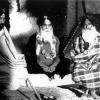Search the Community
Showing results for tags 'granth'.
-
WARNING: IF YOU ARE GOING TO COMMENT ON MY POSTS, PLEASE BE MATURE AND ONLY USE FACTS, NO DRAMA PLEASE Waheguru Ji Ka Khalsa, Waheguru Ji Ki Fateh! Sikhs often love to claim that their "holy book" (Ignore the Abrehamic context) was written and sealed by its founders, and Sikhs still use the same version to this day. However, there have been numerous controversies over the validity of certain passages (you all know what im talking about). Since the original Saroop of the Guru that was written by Bhai Mani Singh Ji and overlooked by Guru Gobind Singh Ji at damdama sahib in 1708 has been lost, and numerious others were destroyed as recently as in 1984 by the Indian Government (they still refuse to give some back), how will have Sikhs preserved the Siri Guru Granth Sahib Ji?
-
VJKK VJKF I am thinking of keeping a saroop of Sri Dasam Granth Ji in my bedroom. I can read Gurmukhi so I can read it. I asked my mom about it and she said yes and she is taking me to DTF (Soho Road) sometime in the holidays (I think they have saroops of Sri Dasam Granth Sahib Ji anyway). I just wanted to know the maryada of keeping Sri Dasam Granth Sahib Ji in my house. My family eat meat etc but they only eat it downstairs but my saroop of Sri Dasam Granth Ji will be kept in my bedroom at all times so none of the meat will go near Maharaj. I just wanted to know if this is alright because if it is beadbi of any sort then I won't bring Maharaj into my house. Its better if Maharaj is kept with the satkaar (respect) it deserves. Please reply soon because I need to know as fast as possible. I will put it in a clean place where it is at a higher level than me. Also, if anyone else owns a saroop of Sri Dasam Granth Sahib then please do tell me what the daily routine of looking after Maharaj is. I really want to be blessed of having Maharaj in my house but if it cannot be treated with the utmost respect then I won't disrespect Sri Dasam Granth Sahib Ji. Please provide as much detail as possible. Thank you. Bhull Chuk Maaf. VJKK VJKF
-
All Sikhs should read these 9 granths 1. Chanaka Raajneeti E wrriten 2000 years ago 2. Sarkutavali E wrriten by Pandit Hardayal Ji linked to Guru Amardas ji's lineage 3. Bhavrasamrit wrriten by Pandit Gulab Singh Ji 4. Vichar Mala E Anath Das Udasi 5. Vairag Shatak E by one of the Sidhs who Guru Nanak meet who became a Sikh 6. Parbodh Chandar Natak E only chapter 1 by Pandit Gulab Singh Ji 7. Adhiatam Parkash by Pandit Sukhdev Singh Ji 8. Birti Parbhakar by Pandit Nischal Das Ji 9. Vichar Sagar E by Pandit Nischal Das Ji They are very important and teach so much. Please read them all. If there is a E beside them that means I found a English Translation of it and English Teeka. Thanks Giani Kamalpreet Singh Ji for the info
-
Does anyone know where the english translation is available? And if someone could briefly explain the Granth, that would be great. WJKK WJKF
- 11 replies
-
2
-
The Gateway to Hell - Sri Sarbloh Guru Granth Sahib ਗਰਬ ਬੁਰਾ ਨਰਕ ਕਾ ਦ੍ਵਾਰਾ ਯਾਂ ਤੇ ਬਚਿ ਕਰਿ ਚਲਿਯੈ ॥ The Ego; this evil is the gateway to hell, tread carefully to avoid it. ਗਰਬ ਘਨੇ ਘਰ ਘਾਲੇ ਮਨ ਰੇ ਗਰਬ ਕਰ ਦੋਜਖ ਗਲਿਯੈ ॥ Oh Mind! Egoism has destroyed countless households, being egotistic has burned many in hell. ਦੇਵ ਅਦੇਵ ਗਰਬ ਕਰ ਪਚਗੇ ਗਰਬ ਕਰ ਕਬਹੁ ਨ ਫਲਿਯੈ ॥ Both the Gods and Demons while engaging with their ego were destroyed, by engaging in Ego one never flourishes. ਨਰ ਬਪੁਰੇ ਕਿਹ ਮਾਹਿ ਕਹਾਵਤੁ ਗਰਬ ਔਤਾਰਨ ਛਲਿਯੈ ॥ What can I say about these dejected people? Their Ego has tricked them into reincarnation over and over again. ਸਭ ਅਉਗਨ ਤੇ ਗਰਬੁ ਗਾਖੜੋ ਪਰਮੇਸ੍ਵਰ ਨਹਿ ਭਾਵਤੁ ॥ Out of all of the vices, Ego is the worst; it is most displeasing to the Highest Lord. ਗਰਬ ਗੰਜ ਹੈ ਨਾਮ ਧਨੀ ਕੋ ਗਰਬੀ ਤੁਰਤ ਪਚਾਵਤੁ ॥ The 'Destroyer of Egoism' is the name of the Master, who destroys quickly the ego in others. ਜਿਹ ਜਿਹ ਗਰਬ ਕੀਨੁ ਹਰਿ ਸੇਤੀ ਤਾਂ ਕੋ ਫਲ ਅਸਿ ਪਾਵਤੁ ॥ Whoever engages with Hari while being egotistical, they will receive the fruit of their Ego. ਰਾਜ ਤੇ ਰੰਕ ਹੋਤੁ ਛਿਨ ਮਾਹੀ ਮਾਨ ਮਹੱਤ੍ਵ ਖੁਹਾਵਤੁ ॥2॥ Hari makes kings into beggars in a moment, and eats away all pride and praise. ਸਰਬਲੋਹ ਗ੍ਰੰਥ, ਭਾਗ 2, ਪੰਨਾ 314 Sarbloh Granth, Volume II., Page 314
-
Who exactly reviews english translations? As i read a lot of different versions, which is right? We really need to sort this out as it distorts the truth.
-
WjkkWjkf Sangat Jee Does anyone have a link or copy of an English translation to the paat Att Chandi Charitr (the short one, but don't mind the long version)...?
- 1 reply
-
- att chandi charitr
- chandi
-
(and 5 more)
Tagged with:
-
Hi i just wanted to ask if someone knows where to find the translation of this shabad, also the shabad in gurmukhi:
- 2 replies
-
- gurbani
- sarbloh granth
-
(and 3 more)
Tagged with:
-
Waheguru ji ka khalsa waheguru ji ki fateh, dhan dhan sri Guru gobind singh ji writes "vaar sri bhagouti ji ki" in the beginning of chandi di vaar. Then maharaj says "inder jeha jodha maitho bhajia." So is maharaj speaking from his point of view or the bhagoutis point of view? bhul chuk maaf karni waheguru ji ka khalsa waheguru ji ki fateh
-
Why are western scholars so against Sri Dasam Granth? They don’t include it in their research on Sikhism. And did the British take out Dasam Bani? Ragi Darshan Singh is their stooge.
-
Waheguru Ji Ka Khalsa. Waheguru Ji Ki Fateh! Often times I hear people say "SGGSJ doesnt say (insert topic) so it must be ok", and in the case of pre-marital sexual relations a dear friend of mine has made the same argument. My friend (non khalsa) argues that Bani specifically condemns rape, adultery, and polygamy, however isnt against sex outside of marriage, provided that both are not married to anyone, and have given consent. My friend likes to disregard anything outside SGGSJ. He brings up tuks from Gurbani that specifically mention "others wives" to support the argument that its specifically about adultery, however I would argue, the English translation is very shallow, and in the context of Bani, "others wives" is also talking about anyone who isnt your wife, and isnt limited to adultery, but also anyone who isnt married. Example 1: Siri Guru Granth Sahib Ji, Ang 274 ਪਰ ਤ੍ਰਿਅ ਰੂਪੁ ਨ ਪੇਖੈ ਨੇਤ੍ਰ ॥ Par Thria Roop N Paekhai Naethr || ਪਰ means other ਤ੍ਰਿਅ means wife Example 2: Siri Guru Granth Sahib Ji, Ang 1013 ਇਸਤ੍ਰੀ ਤਜਿ ਕਰਿ ਕਾਮਿ ਵਿਆਪਿਆ ਚਿਤੁ ਲਾਇਆ ਪਰ ਨਾਰੀ ॥ Abandoning his own wife, he is engrossed in sexual desire; his thoughts are on the wives of others. Context: Its not just talking just about adultery, the English translations are limiting, generally the concept is to not covet another wife, in the context of Bani, doesn't mean you can have sexual relations with women who are not married. Our rehat and history make it clear that one cannot have any sexual relations outside of marriage. There is a specific reason the Guru had 10 forms over 200 years, it was to show Sikhs how to live and practically apply Bani, otherwise the SGGSJ would have been all compiled by Guru Nanak and there would be no long history of the Guru in his many forms. The SGGSJ isnt a rule book, and isnt going to specifically ban everything that we know is immoral. Where in SGGS Ji does it say that Sri Guru Har Rai Sahib Ji was the 7th Guru Sahib after Sri Guru Hargobind Sahib Ji? Why would a primary Sikh text not name him? In terms of Gurbani, when taken into context, and even compared to rehat and our history, its clear that sexual relations outside of marriage are discouraged. Do you agree with my argument? These are just a few tuks I decided to bring up, if anyone has any more, please feel free to share!
-
Waheguru ji ka khalsa waheguru ji ki fateh, After doing much itihaas i have found it that the darshan of Sri Dasam and Sarbloh Darbar is of utmost importance for the sake of the chardikala of the Sikh panth alongside Satguru Granth sahib ji maharaj. What can be done in the uk and in sangats across the world to install sri Dasam granth and Sarbloh Granth as seen in Takht Sri Hazoor sahib were the maryada of the tisarpanth seems to be alive and well aswell as shastar darshan.Can those of us that believe this to be an important issue do anything to create change? The majority of non amritdharis seem to think that we only have one granth which sadness me. Our connection to Dasam pita seems to be cut when the majority of sikhs are ignorant on these traditions What can be done? Bhull chukk maaf karo, A manmukh.
-
Waheguru Here is a collection of some puratan granths Bhai Bala Wale Janamsakhi B40 Janamsakhi- Written in A.D. 1733 by Daya Ram Abrol--History of Guru Nanak Sahib Ji Prem Sumarag Granth--Rehat Maryada, In english Parchian Sewa Das- Written around 1708 English Sri Guru Sobha Granth- written in 1711 Sri Guru Sobha Granth (English) Basawalinama by Kesar Singh Chhibbar written 1769. Bansawali Nama Dasan Patshahian Ka Gurbilas Patshahi 6 History of Guru Hargobind Sahib Ji Gurbilas Patshahi 10 written 1751 by Koer Singh Sou sakhi-Sri Gur Ratan Mal Mehma Parkash Khand 1 by Saroop Das Bhalla Written in 1741 Mehma Parkash Khand 2 by Saroop Das Bhalla Written in 1741 Sikhan Di Bhagat Mala-By Shahid Bhai Mani Singh Ji Patshahi Dasvi SAU SAKHI--Interesting granth
-
So, ive had mukat marag granth for a while. so far as i know ram dayal is the student of sada nand and they wrote those most beautiful couplets about viraag and naam. really amazing. i just want to confirm who are these two people? and what time were they around (alive)?. since mukat marag granth is guru ji's krit (as it says in the foreword), is "ath giaan sudha-ras granth" also guru jis krit like a guro vaach ( just as bhai nandlaal ju rehet nama) where guru ji gives giyaan in the giaan sudha-ras granth ? thanks to anyone who helps
-
Waheguru While browsing the site www.gursevak.com i came upon this statement, The 5 singhs also kept handy 2 sainchees or bhags (SGGS in 2 volumes) which used to be a referencing source for Sant Gurbachan Singh Ji most of the time. The two volumes used by Baba Ji are online, i think most people will be interested in downloading them. But beware the files are big Purtaan Bhag Volume 1 Purtaan Bhag Volume 2 Waheguru
-
Wrong Gurbani translations and ignorance are being used by several Dawah and Christian Missionary organisations. Even if not, it is our duty to understand GurShabad correctly, so lets use this thread to correct (wrong) prevalent Shabads. ਮੁਸਲਮਾਣੁ ਕਹਾਵਣੁ ਮੁਸਕਲੁ ਜਾ ਹੋਇ ਤਾ ਮੁਸਲਮਾਣੁ ਕਹਾਵੈ ॥ ਅਵਲਿ ਅਉਲਿ ਦੀਨੁ ਕਰਿ ਮਿਠਾ ਮਸਕਲ ਮਾਨਾ ਮਾਲੁ ਮੁਸਾਵੈ ॥ ਹੋਇ ਮੁਸਲਿਮੁ ਦੀਨ ਮੁਹਾਣੈ ਮਰਣ ਜੀਵਣ ਕਾ ਭਰਮੁ ਚੁਕਾਵੈ ॥ ਰਬ ਕੀ ਰਜਾਇ ਮੰਨੇ ਸਿਰ ਉਪਰਿ ਕਰਤਾ ਮੰਨੇ ਆਪੁ ਗਵਾਵੈ ॥ ਤਉ ਨਾਨਕ ਸਰਬ ਜੀਆ ਮਿਹਰੰਮਤਿ ਹੋਇ ਤ ਮੁਸਲਮਾਣੁ ਕਹਾਵੈ ॥੧॥ 141, Guru Granth Sahib Ji Wrong translation: Where is anything like 'religion of the Prophet' 'faith of Mohammad' mentioned in the original Gurbani? Actual translation (taken from SearchSikhism): It is difficult to be called a Muslim; if one can become a true Muslim (by surrendering completely to the Will of Waheguru), only then he may be called one. First requirement to become a true Muslim is to love the Dharam (religion) i.e. truth. Then cleanse the mind by sharing the wealth with poor and needy. This way false pride of possessions of worldly wealth goes away. Secondly, if the Gurbani tells one to become a true Muslim then why doesn't it say to recite Kalimah, the Quran, Namaz, go on Hajj, etc ? Muslim word is being redefined just like Jati ceases being celibacy when used in Gurbani context. Please post more Shabads and try to correct them.
-
The political correctness is ruining our Nation. The 'all religion leading to God' mentality is a major cause for inter-faith marriages and conversions of Sikhs. The idea does not find any place in Gurmat, for religious practices of Islam, Hinduism, Jainism were rejected and heavily criticised in Dhur Ki Bani, Guru Granth Sahib. The Gurus and Bhagats rejecting Islam (Hajj, Circumcision and Ramadan) I do not keep fasts, nor do I observe the month of Ramadaan. (M5, 1136, Guru Granth Sahib) Because of the love of woman, circumcision is done; I don't believe in it, O Siblings of Destiny. Devotee Kabir (Bhagat Kabeer, 477, Guru Granth Sahib) The Gurus and Bhagats rejecting Hinduism (Idol Worship, Teerath Yatra, Ekadashi fast amongst others) I have stopped fasting on Ekadashi; why should I bother to go on Teerath to sacred shrines? (Bhagat Naamdev, 718, Guru Granth Sahib) O brother, why worship idols of gods and goddesses, what can you ask of them and what can they give to you? What is the use of washing stones, which themselves drown in water? (M1, 637, Guru Granth Sahib) I have searched many Shastars and Simrtis, they do not show the way to God, but contemplation on God is invaluable. (M5, 264, Guru Granth Sahib) Guru Nanak Sahib's satire of Jainism (about 5 million followers) Shalok, First Mehl: They pluck the hair out of their heads, and drink in filthy water; they beg endlessly and eat the garbage which others have thrown away. They spread manure, they suck in rotting smells, and they are afraid of clean water. Their hands are smeared with ashes, and the hair on their heads is plucked out-they are like sheep! They have renounced the lifestyle of their mothers and fathers, and their families and relatives cry out in distress. ... (M1, 148, Guru Granth Sahib Ji)
-
Recently whilst traversing the infinite scope of the worldwide web I encountered a diabolical troll of ******* faith who was substituting the Damdami Bir with the Kartarpuri Bir. Of course hes aware of what he is doing but because ***** requires fallacious excuses for conversion he sails ever ahead. Sending him a rebuttal only allows him to heavily edit it and proclaim his own superiority. But let us look at some historical facts in light of his missing intelligence. http://tisarpanth.blogspot.co.nz/2013/08/the-bhai-hardas-manuscript.html http://tisarpanth.blogspot.co.nz/2013/07/giani-gian-singh-nirmalas-gian.html I apologise for not being able to post the full articles on the forum.
-
Wahegurujikakhalsawahegurujikifateh There was a Bhagat from Lahore called Chajju. One day at his door two labourers were stood outside. At the time it was raining. Bhagat Chajju looked at the labourers and asked why they were stood outside his door. They looked at Bhagatji and said that they work for a living outdoors doing labour. Their condition was such that when they didn't work, they didn't eat. They explained to Bhagatji that when it rains they don't find much work. As a consequence they had come to Bhagat Chajjuji's door in the hope of finding some work. Bhagatji invited them into his house to offer them work . He said not only will I feed you - sugar and koi - but I will pay you double your usual rate. Bhagatji offered 8 annas instead of the 4 annas the labourers were usually paid for a days work. Bhagatji then sat the two labourers down, gave them malas and said sit down and doing abhiyaas of Raam. At the end of the day Bhagatji fed the labourers and paid them 8 annas. He then told them come here daily and partake in this work and I will continue to pay and feed you in this way. The labourers looked at Bhagat Chajjuji and said this work is too difficult to do. We would rather lift and break stones than do hard manual labour than this work... Loose translation of Katha by Sant Gyani Baba Gurbachan Singh Ji Bhindranwale Why is it so hard? Wahegurujikakhalsawahegurujikifateh
-
Wahegurujikakhalsawahegurujikifateh, Has anyone read this book on Sri Zafarnama Sahib Ji? If so what did you make of it? Is it worth buying? The following is a book description on Amazon: Louis E. Fenech offers a compelling new examination of one of the only Persian compositions attributed to the tenth Sikh Guru, Guru Gobind Singh (1666-1708): the Zafar-namah or 'Epistle of Victory.' Written as a masnavi, a Persian poem, this letter was originally sent to the Mughal emperor Aurangzeb (d. 1707) rebuking his most unbecoming conduct. Incredibly, Guru Gobind Singh's letter is included today within the Sikh canon, one of only a very small handful of Persian-language texts granted the status of Sikh scripture. As such, its contents are sung on special Sikh occasions. Perhaps equally surprising is the fact that the letter appears in the tenth Guru's book or the Dasam Granth in the standard Gurmukhi script (in which Punjabi is written) but retains its original Persian language, a vernacular few Sikhs know. Drawing out the letter's direct and subtle references to the Iranian national epic, the Shah-namah, and to Shaikh Sa'di's thirteenth-century Bustan, Fenech demonstrates how this letter served as a form of Indo-Islamic verbal warfare, ensuring the tenth Guru's moral and symbolic victory over the legendary and powerful Mughal empire. Through analysis of the Zafar-namah, Fenech resurrects an essential and intriguing component of the Sikh tradition: its Islamicate aspect. Gururakha, Wahegurujikakhalsawahegurujikifateh
-
Wahegurujikakhalsawahegurujikifateh, I'm doing some research into the Das Grahin currently. Compassion Charity Forgiveness Cleanliness Control of mind Purity Appreciation of truth Spiritually accomplished being Warrior Devotee to God and no other Does anyone know which ang in Sri Sarbloh Granth Sahib Ji Guru Sahib has written about these ten qualities/virtues? Wahegurujikakhalsawahegurujikifateh










